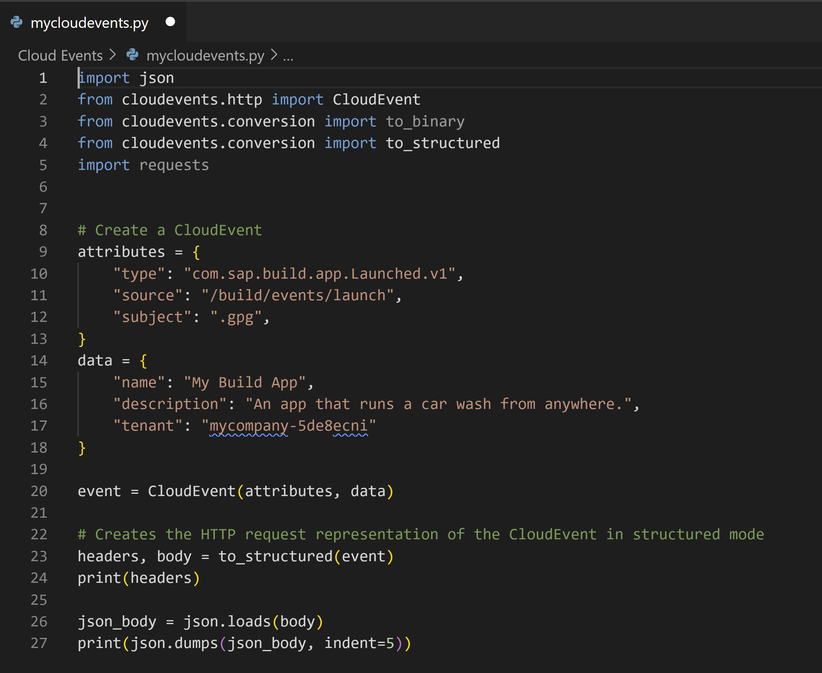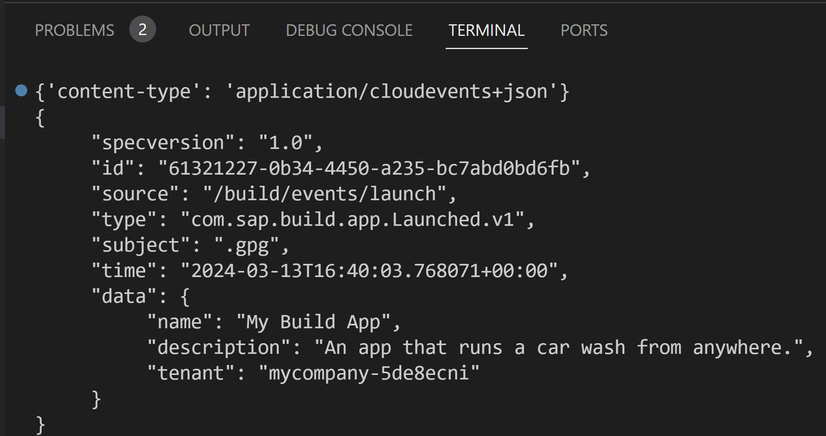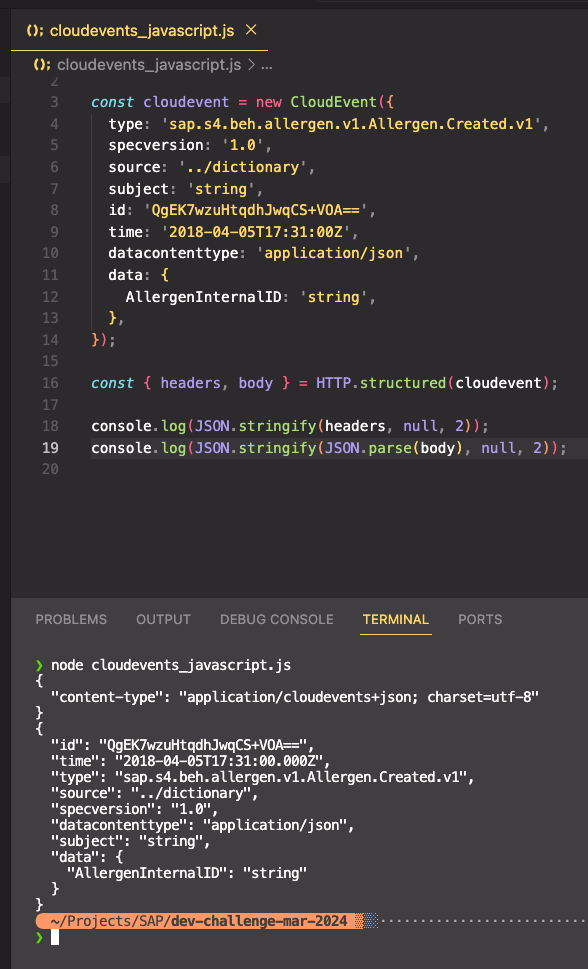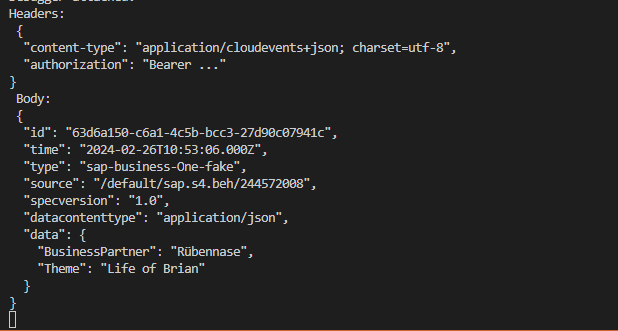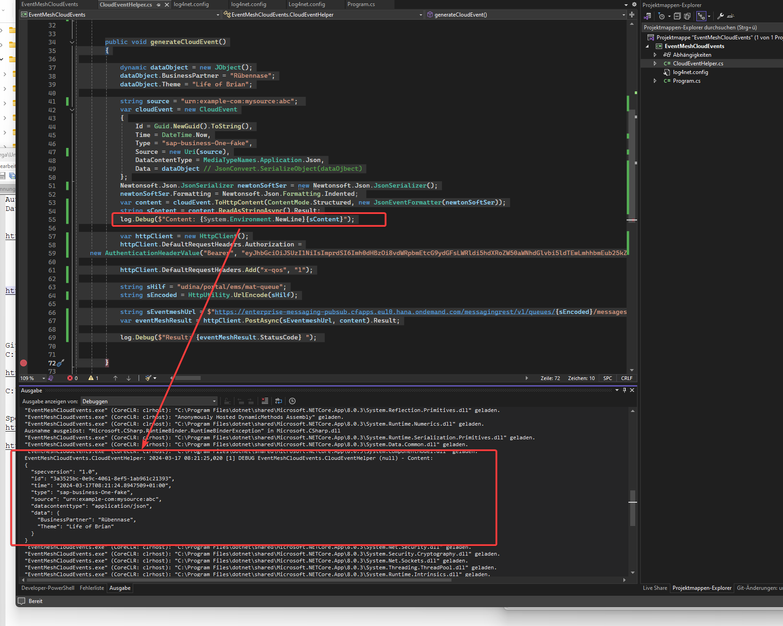- SAP Community
- Groups
- Interest Groups
- Application Development
- Discussions
- Re: March Developer Challenge - CloudEvents: Week ...
- Subscribe to RSS Feed
- Mark Topic as New
- Mark Topic as Read
- Float this Topic for Current User
- Bookmark
- Subscribe
- Mute
- Printer Friendly Page
March Developer Challenge - CloudEvents: Week 2
- Mark as New
- Bookmark
- Subscribe
- Mute
- Subscribe to RSS Feed
- Permalink
- Report Inappropriate Content
03-12-2024 2:34 PM - edited 03-25-2024 8:30 AM
As we learned last week, CloudEvents is a specification for describing event data in common formats and the goal is to provide interoperability across services, platforms and systems. This week we will expand on what we learnt last week and we will create our first CloudEvent programmatically.
Links to March's developer challenge:
- Week 1: https://community.sap.com/t5/application-development-discussions/march-developer-challenge-cloudeven...
- Week 2: https://community.sap.com/t5/application-development-discussions/march-developer-challenge-cloudeven...
- Week 3: https://community.sap.com/t5/application-development-discussions/march-developer-challenge-cloudeven...
- Week 4: https://community.sap.com/t5/application-development-discussions/march-developer-challenge-cloudeven...
CloudEvent format
Event Formats specify how to serialize a CloudEvent with certain encoding formats. Depending on our requirements it is possible that we might need to use a specific format to encode our CloudEvent message. Maybe we have a requirement where we need to send the data in something different than the JSON format, e.g. AVRO, Protobuf. Check out the specification document if you want to learn more about these different formats.
For simplicity purposes we will stick to the JSON Event format as it is the most common and easiest to interact with.
Now that we are familiar with what a CloudEvent is, what a CloudEvent message looks like, and the different Event Formats available, let's see how we can create one programmatically.
CloudEvents SDK
There are language-specific SDKs that can be used to create a message that complies with the CloudEvents standard. Below is a list of the different languages that there's an SDK for:
You might be thinking, why would I need an SDK when I can create the message "manually" as well? Using an SDK allows us to easily create a CloudEvent message, ensure that it follows the guidelines defined in the standard, and simplify generating the output format. Not only that but it can also be used to parse a CloudEvent message that our application consumes. As an example, I will use the Python SDK to create the CloudEvent message for the Ticket Management System that I used as an example previously.
from cloudevents.http import CloudEvent
from cloudevents.conversion import to_binary
import requests
ticket_id = "IT00010232"
# Create a CloudEvent
attributes = {
"type": "com.ajmaradiaga.tms.Ticket.Created.v1",
"source": "https://tms-prod.ajmaradiaga.com/tickets",
"subject": ticket_id,
}
data = {
"ID": ticket_id,
"Description": "Install ColdTurkey to block distracting websites.",
"Urgency": {
"ID": 1,
"Description": "High"
}
}
event = CloudEvent(attributes, data)
# Creates the HTTP request representation of the CloudEvent in binary content mode
headers, body = to_binary(event)
print(body)
Week 2 challenge - Create a CloudEvent using an SDK
👉 Your task for this week is: Pick your favourite language from the list above and create the message that you shared as part of week's 1 challenge but this time instead of doing it manually, you will do it using an SDK. To complete this week's challenge, share the code you used to create the CloudEvent message and a screenshot of your program's output.
What if there is no SDK available for your favourite language? Not a problem, you can create the message structure "manually". Just share the code used to generate a message in your programming language and a screenshot of the program's output.
- SAP Managed Tags:
- API,
- Python,
- SAP Event Mesh,
- SAP Event Broker for SAP cloud applications
- Labels:
-
Cloud Native
-
CloudEvents
-
SDK
-
Tools
- Mark as New
- Bookmark
- Subscribe
- Mute
- Subscribe to RSS Feed
- Permalink
- Report Inappropriate Content
03-12-2024 2:35 PM
Using as a reference my solution for week 1, I will use the CloudEvents Python SDK.
Code
import json
from cloudevents.conversion import to_structured
from cloudevents.http import CloudEvent
import requests
# Create a CloudEvent
# - The CloudEvent "id" is generated if omitted. "specversion" defaults to "1.0".
attributes = {
"type": "com.ajmaradiaga.tms.Ticket.Created.v1",
"source": "https://tms-prod.ajmaradiaga.com/tickets",
}
data = {
"id": "IT00010232",
"description": "Install ColdTurkey to block distracting websites.",
"urgency": {
"id": 1,
"description": "High"
}
}
event = CloudEvent(attributes, data)
# Creates the HTTP request representation of the CloudEvent in structured content mode
headers, body = to_structured(event)
print(headers)
json_body = json.loads(body)
# Pretty print json
print(json.dumps(json_body, indent=2))
Screenshot of the program running

- SAP Managed Tags:
- API,
- Python,
- SAP Event Mesh,
- SAP Event Broker for SAP cloud applications
- Mark as New
- Bookmark
- Subscribe
- Mute
- Subscribe to RSS Feed
- Permalink
- Report Inappropriate Content
03-12-2024 3:25 PM
Here is my submission 🖖
Code JS:
const { CloudEvent, HTTP } = require("cloudevents");
const ce = new CloudEvent({
specversion: "1.0",
type: "com.example.iot.device.event.v1",
source: "https://iot-prod.example.com/devices",
subject: "device12345-temperature-alert",
id: "e241f360-4b3f-4c9b-a5e4-d35456b27f62",
time: "2024-03-06 08:34:00",
datacontenttype: "application/json",
data: {
device_id: "Device12345",
event_type: "temperature-alert",
description: "Temperature threshold exceeded.",
data: {
temperature: 75,
threshold: 70,
units: "Celsius",
},
},
});
const { headers, body } = HTTP.structured(ce);
console.log("Headers:");
console.log(JSON.stringify(headers, null, 2) + "\n");
console.log("Body:");
console.log(JSON.stringify(JSON.parse(body), null, 2) + "\n");Result:
- SAP Managed Tags:
- API,
- Python,
- SAP Event Mesh,
- SAP Event Broker for SAP cloud applications
- Mark as New
- Bookmark
- Subscribe
- Mute
- Subscribe to RSS Feed
- Permalink
- Report Inappropriate Content
03-12-2024 8:32 PM - edited 03-12-2024 8:37 PM
Code PWS:
$cloudEvent = New-CloudEvent `
-Type 'com.example.iot.device.event.v1' `
-Source 'https://iot-prod.example.com/devices' `
-Id 'e241f360-4b3f-4c9b-a5e4-d35456b27f62' `
-Time '2024-03-06 08:34:00' `
$cloudEvent | Set-CloudEventJsonData -Data @{
specversion = "1.0"
type = "com.example.iot.device.event.v1"
source = "https://iot-prod.example.com/devices"
subject = "device12345-temperature-alert"
id = "e241f360-4b3f-4c9b-a5e4-d35456b27f62"
time = "2024-03-06 08:34:00"
datacontenttype = "application/json"
data = @{
device_id = "Device12345"
event_type = "temperature-alert"
description = "Temperature threshold exceeded."
data = @{
temperature = 75
threshold = 70
units = "Celsius"
}
}
} > $null
$cloudEventStructuredHttpMessage = $cloudEvent | ConvertTo-HttpMessage -ContentMode Structured
Write-Host
Write-Host "Headers:" -ForegroundColor Green
$cloudEventStructuredHttpMessage.Headers
Write-Host
Write-Host "Body:" -ForegroundColor Green
Read-CloudEventData -CloudEvent $cloudEvent
Result:
- SAP Managed Tags:
- API,
- Python,
- SAP Event Mesh,
- SAP Event Broker for SAP cloud applications
- Mark as New
- Bookmark
- Subscribe
- Mute
- Subscribe to RSS Feed
- Permalink
- Report Inappropriate Content
03-13-2024 5:41 AM - edited 03-13-2024 5:42 AM
@r00k13d3v Absolutely love this.... it never crossed my mind that someone would share something using the Powershell SDK... AMAZING!
- SAP Managed Tags:
- API,
- Python,
- SAP Event Mesh,
- SAP Event Broker for SAP cloud applications
- Mark as New
- Bookmark
- Subscribe
- Mute
- Subscribe to RSS Feed
- Permalink
- Report Inappropriate Content
03-13-2024 8:29 PM
- SAP Managed Tags:
- API,
- Python,
- SAP Event Mesh,
- SAP Event Broker for SAP cloud applications
- Mark as New
- Bookmark
- Subscribe
- Mute
- Subscribe to RSS Feed
- Permalink
- Report Inappropriate Content
03-12-2024 5:05 PM
My reference for week 1:
My JS code:
const { CloudEvent, HTTP} = require("cloudevents");
// Create a new CloudEvent
const ce = new CloudEvent({
"specversion": "1.0",
"id": "62706ed3-3f4c-4a48-a2e7-8f201301822b",
"type": ".com.alpesadevcha.v1",
"source": "/alpesadev/test",
"time": "2024-03-07T08:00:00Z",
"datacontenttype": "application/json",
"data": {
"employee": "80001000"
}
});
//
const { headers, body } = HTTP.structured(ce);
console.log(
"Headers:", "\n",
JSON.stringify(headers, null, 2), "\n",
"Body:", "\n",
JSON.stringify(JSON.parse(body), null, 2));Output:
Headers:
{
"content-type": "application/cloudevents+json; charset=utf-8"
}
Body:
{
"id": "62706ed3-3f4c-4a48-a2e7-8f201301822b",
"time": "2024-03-07T08:00:00.000Z",
"type": ".com.alpesadevcha.v1",
"source": "/alpesadev/test",
"specversion": "1.0",
"datacontenttype": "application/json",
"data": {
"employee": "80001000"
}
}- SAP Managed Tags:
- API,
- Python,
- SAP Event Mesh,
- SAP Event Broker for SAP cloud applications
- Mark as New
- Bookmark
- Subscribe
- Mute
- Subscribe to RSS Feed
- Permalink
- Report Inappropriate Content
03-12-2024 6:30 PM
- Mark as New
- Bookmark
- Subscribe
- Mute
- Subscribe to RSS Feed
- Permalink
- Report Inappropriate Content
03-13-2024 5:44 AM - edited 03-13-2024 5:55 AM
@emiliocampo Thanks for sharing the to_binary representation, so others can see what the difference is when outputting to_structured and to_binary. Great example!
- SAP Managed Tags:
- API,
- Python,
- SAP Event Mesh,
- SAP Event Broker for SAP cloud applications
- Mark as New
- Bookmark
- Subscribe
- Mute
- Subscribe to RSS Feed
- Permalink
- Report Inappropriate Content
03-13-2024 11:37 AM
from cloudevents.conversion import to_structured
from cloudevents.http import CloudEvent
import json
attributes = {
"type": "com.servicechannel.WorkOrder.Created.v1",
"source": "https://test.servicechannel.com/workorders",
}
data = {
"purchaseNumber": "84409626",
"status": {
"primary": "open"
}
}
event = CloudEvent(attributes, data)
headers, body = to_structured(event)
print(f"Content-Type: {headers['content-type']}\n")
json_body = json.loads(body)
print(f"Sample Cloud Event: \n{json.dumps(json_body, indent=2)}")
- SAP Managed Tags:
- API,
- Python,
- SAP Event Mesh,
- SAP Event Broker for SAP cloud applications
- Mark as New
- Bookmark
- Subscribe
- Mute
- Subscribe to RSS Feed
- Permalink
- Report Inappropriate Content
03-13-2024 4:00 PM - edited 03-13-2024 4:02 PM
//Importing Cloud Event libraries.
const { CloudEvent, HTTP } = require("cloudevents");
const type = "com.awesome_company.sales_order.Updated.v1"
const source = "https://prod.illidian.awesome_company.com/sales_orders"
const salesOrderID = "9024000013"
const company = "AWO01"
const year = 2024
const statusSO = "Shipped"
const subject = company + salesOrderID + year
const data = {
"salesOrder": salesOrderID,
"company": company,
"year": year,
"status": statusSO
}
//creating and calling event
const soEvent = new CloudEvent({type,source,subject,data})
const { headers, body } = HTTP.structured(soEvent);
//print the log
console.log("### March Developer Challenge - CloudEvents: Week 2 ###\n");
console.log("- HTTP Event Headers - \n")
for (const key in headers) {
console.log(`Key: "${key}", Value: "${headers[key]}"`);
}
console.log("\n - HTTP Event Body - \n");
console.log(JSON.stringify(JSON.parse(body), null, 1) + "\n");JS!
- SAP Managed Tags:
- API,
- Python,
- SAP Event Mesh,
- SAP Event Broker for SAP cloud applications
- Mark as New
- Bookmark
- Subscribe
- Mute
- Subscribe to RSS Feed
- Permalink
- Report Inappropriate Content
03-13-2024 4:41 PM
- SAP Managed Tags:
- API,
- Python,
- SAP Event Mesh,
- SAP Event Broker for SAP cloud applications
- Mark as New
- Bookmark
- Subscribe
- Mute
- Subscribe to RSS Feed
- Permalink
- Report Inappropriate Content
03-13-2024 9:40 PM
Why not creating the CloudEvent in Groovy if we want to use Integration Suite for that?
import com.sap.gateway.ip.core.customdev.util.Message
import java.util.HashMap
import java.text.SimpleDateFormat
def Message processData(Message message) {
//read properties
def properties = message.getProperties()
specversion = properties.get("specversion")
type = properties.get("type")
source = properties.get("source")
id = properties.get("id")
//create timestamp
def date = new Date()
def sdf = new SimpleDateFormat("yyyy-MM-dd HH:mm:ss")
//read data from body
def data = message.getBody(String)
//create CloudEvent
message.setBody("{\r\n\"specversion\": \"" + specversion +"\",\r\n\"type\": \""+ type +"\",\r\n\"source\": \""+ source +"\",\r\n\"id\": \""+ id +"\",\r\n\"time\": \""+ sdf.format(date) +"\",\r\n\"datacontenttype\": \"application/json\",\r\n\"data\":" + data + "}")
return message
}
- SAP Managed Tags:
- API,
- Python,
- SAP Event Mesh,
- SAP Event Broker for SAP cloud applications
- Mark as New
- Bookmark
- Subscribe
- Mute
- Subscribe to RSS Feed
- Permalink
- Report Inappropriate Content
03-14-2024 9:30 AM
import json
from cloudevents.conversion import to_json
from cloudevents.http import CloudEvent
attributes = {
"type": "sap.s4.beh.productionorder.v1.ProductionOrder.Created.v1",
"source": "https://m32z.ucc.ovgu.de/",
}
data = {
"ProductionOrder": "1000206",
"ProductionOrderType": "PP01",
"ProductionPlant": "HD00",
}
event = CloudEvent(attributes, data)
print(json.dumps(json.loads(to_json(event)), indent=2))- SAP Managed Tags:
- API,
- Python,
- SAP Event Mesh,
- SAP Event Broker for SAP cloud applications
- Mark as New
- Bookmark
- Subscribe
- Mute
- Subscribe to RSS Feed
- Permalink
- Report Inappropriate Content
03-14-2024 9:46 AM
Hello ,
Here is my Week1 response.
Below is my JS code to populate the same Cloud Event :

- SAP Managed Tags:
- API,
- Python,
- SAP Event Mesh,
- SAP Event Broker for SAP cloud applications
- Mark as New
- Bookmark
- Subscribe
- Mute
- Subscribe to RSS Feed
- Permalink
- Report Inappropriate Content
03-14-2024 10:04 AM
Here is my submission
const { CloudEvent, HTTP } = require("cloudevents");
const ce = new CloudEvent({
specversion: "1.0",
type: "sap.s4.beh.centralrequestforquotation.v1.CentralRequestForQuotation.SuccssrDocCrted.v1",
source: "/default/sap.s4.beh/s4hc",
id: "QgEK7wzuHtqdeJwqCS+VOA==",
time: "2024-03-11T13:00:00Z",
datacontenttype: "application/json",
data: {
CentralRequestForQuotation: "7500000012"
},
});
const { headers, body } = HTTP.structured(ce);
console.log("Headers:");
console.log(JSON.stringify(headers, null, 2) + "\n");
console.log("Body:");
console.log(JSON.stringify(JSON.parse(body), null, 2) + "\n");
Headers:
{
"content-type": "application/cloudevents+json; charset=utf-8"
}
Body:
{
"id": "QgEK7wzuHtqdeJwqCS+VOA==",
"time": "2024-03-11T13:00:00.000Z",
"type": "sap.s4.beh.centralrequestforquotation.v1.CentralRequestForQuotation.SuccssrDocCrted.v1",
"source": "/default/sap.s4.beh/s4hc",
"specversion": "1.0",
"datacontenttype": "application/json",
"data": {
"CentralRequestForQuotation": "7500000012"
}
}- SAP Managed Tags:
- API,
- Python,
- SAP Event Mesh,
- SAP Event Broker for SAP cloud applications
- Mark as New
- Bookmark
- Subscribe
- Mute
- Subscribe to RSS Feed
- Permalink
- Report Inappropriate Content
03-14-2024 11:56 AM
- Mark as New
- Bookmark
- Subscribe
- Mute
- Subscribe to RSS Feed
- Permalink
- Report Inappropriate Content
03-14-2024 2:15 PM
- SAP Managed Tags:
- API,
- Python,
- SAP Event Mesh,
- SAP Event Broker for SAP cloud applications
- Mark as New
- Bookmark
- Subscribe
- Mute
- Subscribe to RSS Feed
- Permalink
- Report Inappropriate Content
03-15-2024 5:06 AM
Here is my submission for Week 2:
- SAP Managed Tags:
- API,
- Python,
- SAP Event Mesh,
- SAP Event Broker for SAP cloud applications
- Mark as New
- Bookmark
- Subscribe
- Mute
- Subscribe to RSS Feed
- Permalink
- Report Inappropriate Content
03-15-2024 11:25 AM
Hello,
My solution for week 1: week-1-solution , I will use python sdk
Code:
import json
from cloudevents.conversion import to_structured
from cloudevents.http import CloudEvent
# Create a CloudEvent
# - The CloudEvent "id" is generated if omitted. "specversion" defaults to "1.0".
attributes = {
"type": "sap.s4.beh.product.v1.Product.Changed.v1",
"source": "../dictionary",
"subject": "productId:123",
}
data = {
"Product": "123",
"ProductCategory": "TELE",
"ProductType": "LCD"
}
event = CloudEvent(attributes, data)
# Creates the HTTP request representation of the CloudEvent in structured content mode
headers, body = to_structured(event)
print("headers:")
print(headers)
print()
json_body = json.loads(body)
# Pretty print json
print("body:")
print(json.dumps(json_body, indent=2))Screenshot of the output:
- SAP Managed Tags:
- API,
- Python,
- SAP Event Mesh,
- SAP Event Broker for SAP cloud applications
- Mark as New
- Bookmark
- Subscribe
- Mute
- Subscribe to RSS Feed
- Permalink
- Report Inappropriate Content
03-15-2024 12:50 PM
Here is my submission for Week 2:
Here is the output,
- SAP Managed Tags:
- API,
- Python,
- SAP Event Mesh,
- SAP Event Broker for SAP cloud applications
- Mark as New
- Bookmark
- Subscribe
- Mute
- Subscribe to RSS Feed
- Permalink
- Report Inappropriate Content
03-15-2024 5:57 PM - edited 03-15-2024 8:59 PM
I used the Rust SDK (although I'm a little rusty 😉😞
use cloudevents::{EventBuilder, EventBuilderV10};
use serde_json::json;
use http::request::Request;
use std::str;
use chrono::Utc;
fn main() {
let now = Utc::now().to_rfc3339();
let event = EventBuilderV10::new()
.id("A234-1234-1234")
.source("/myapp/resources/1234567890")
.ty("com.example.myapp.resource.created")
.time(now)
.data(
"application/json",
json!({
"resourceId": "1234567890",
"resourceName": "My Resource",
"resourceType": "myapp.com/resources"
}),
)
.build()
.unwrap();
// Convert the event to a HTTP representation in binary content mode
let http_request = Request::builder()
.method("POST")
.uri("http://example.com")
.header("ce-specversion", "1.0")
.header("ce-type", "com.example.myapp.resource.created")
.header("ce-source", "/myapp/resources/1234567890")
.header("ce-id", "A234-1234-1234")
.header("ce-time", "2023-03-05T18:00:00Z")
.header("Content-Type", "application/json")
.body(serde_json::to_vec(&event).unwrap())
.unwrap();
// Print out the HTTP request
println!("HTTP Method: {}", http_request.method());
println!("URI: {}", http_request.uri());
for (key, value) in http_request.headers() {
println!("Header: {}={}", key, value.to_str().unwrap());
}
println!("Body: {}", str::from_utf8(http_request.body()).unwrap());
}
The results:
- SAP Managed Tags:
- API,
- Python,
- SAP Event Mesh,
- SAP Event Broker for SAP cloud applications
- Mark as New
- Bookmark
- Subscribe
- Mute
- Subscribe to RSS Feed
- Permalink
- Report Inappropriate Content
03-15-2024 8:52 PM - edited 03-15-2024 8:57 PM
Here's a solution in C#
using CloudNative.CloudEvents;
using CloudNative.CloudEvents.Http;
using CloudNative.CloudEvents.NewtonsoftJson;
using System.Net.Mime;
using Newtonsoft.Json;
namespace CloudEventsApp
{
class Program
{
static async Task Main(string[] args)
{
DateTime currentTimeUtc = DateTime.UtcNow;
var cloudEvent = new CloudEvent
{
Id = "A234-1234-1234",
Type = "com.example.myapp.resource.created",
Source = new Uri("urn:/myapp/resources/1234567890"),
Time = currentTimeUtc, //DateTime.Parse("2023-03-05T18:00:00Z").ToUniversalTime(),
DataContentType = MediaTypeNames.Application.Json,
Data = JsonConvert.SerializeObject(new
{
resourceId = "1234567890",
resourceName = "My Resource",
resourceType = "myapp.com/resources"
})
};
var httpClient = new HttpClient();
var content = cloudEvent.ToHttpContent(ContentMode.Structured, new JsonEventFormatter());
foreach (var header in content.Headers)
{
Console.WriteLine($"Header: {header.Key}={string.Join(", ", header.Value)}");
}
string contentString = await content.ReadAsStringAsync();
Console.WriteLine(contentString);
//If you want to acatually send the request
//var result = await httpClient.PostAsync(Url, content);
// Console.WriteLine($"Response status code: {response.StatusCode}");
}
}
}
- SAP Managed Tags:
- API,
- Python,
- SAP Event Mesh,
- SAP Event Broker for SAP cloud applications
- Mark as New
- Bookmark
- Subscribe
- Mute
- Subscribe to RSS Feed
- Permalink
- Report Inappropriate Content
03-17-2024 6:14 AM
- Mark as New
- Bookmark
- Subscribe
- Mute
- Subscribe to RSS Feed
- Permalink
- Report Inappropriate Content
03-15-2024 6:44 PM
const { HTTP, CloudEvent } = require('cloudevents');
// Create a new CloudEvent
const ce = new CloudEvent({
"specversion": "1.0",
"type": "com.nk.cloudevents.PurchaseOrder.Created.v1",
"source": "https://cloudevents.nk.com/PO",
"subject": "New PO 4500000001 Created",
"id": "b93ac0f9-86e8-4d85-bbdd-6da5e474ba1d",
"time": "2024-03-15 07:10:00",
"datacontenttype": "application/json",
"data": {
"PurchaseOrder": "4500000001",
"POType": "NB",
"POOrg": "1000"
}
})
const binaryMessage = HTTP.binary(ce);
const structuredMessage = HTTP.structured(ce);
console.log(ce.toJSON())
console.log('--------------BINARY MESSAGE--------------------')
console.log(binaryMessage)
console.log('------------STRUCTURED MESSAGE----------------------')
console.log(structuredMessage)Output
- SAP Managed Tags:
- API,
- Python,
- SAP Event Mesh,
- SAP Event Broker for SAP cloud applications
- Mark as New
- Bookmark
- Subscribe
- Mute
- Subscribe to RSS Feed
- Permalink
- Report Inappropriate Content
03-16-2024 4:13 PM
const { HTTP, CloudEvent } = require("cloudevents");
const ce = new CloudEvent({
"type": "sap.s4.beh.purchaserequisition.v1.PurchaseRequisition.Changed.v1",
"specversion": "1.0",
"source": "nedgia/eventmeshdev/dev",
"id": "AA06tkhWHt6FoCOmSZ/6+Q==",
"time": "2023-06-27T15:40:17Z",
"datacontenttype": "application/json",
"data": {
"PurchaseRequisition": "60004767"
}
});
const message = HTTP.structured(ce)
console.log(message)
- SAP Managed Tags:
- API,
- Python,
- SAP Event Mesh,
- SAP Event Broker for SAP cloud applications
- Mark as New
- Bookmark
- Subscribe
- Mute
- Subscribe to RSS Feed
- Permalink
- Report Inappropriate Content
03-17-2024 8:07 AM
----------------------------------------------------------------------------------------------------------------
Node-Js:
----------------------------------------------------------------------------------------------------------------
------Source
----- Result
----------------------------------------------------------------------------------------------------------------
DotNet c#
----------------------------------------------------------------------------------------------------------------
Source:
public void generateCloudEvent()
{
dynamic dataObject = new JObject();
dataObject.BusinessPartner = "Rübennase";
dataObject.Theme = "Life of Brian";
string source = "urn:example-com:mysource:abc";
var cloudEvent = new CloudEvent
{
Id = Guid.NewGuid().ToString(),
Time = DateTime.Now,
Type = "sap-business-One-fake",
Source = new Uri(source),
DataContentType = MediaTypeNames.Application.Json,
Data = dataObject // JsonConvert.SerializeObject(dataOjbect)
};
Newtonsoft.Json.JsonSerializer newtonSoftSer = new Newtonsoft.Json.JsonSerializer();
newtonSoftSer.Formatting = Newtonsoft.Json.Formatting.Indented;
var content = cloudEvent.ToHttpContent(ContentMode.Structured, new JsonEventFormatter(newtonSoftSer));
string sContent = content.ReadAsStringAsync().Result;
log.Debug($"Content: {System.Environment.NewLine}{sContent}");
var httpClient = new HttpClient();
httpClient.DefaultRequestHeaders.Authorization =
new AuthenticationHeaderValue("Bearer", "..");
httpClient.DefaultRequestHeaders.Add("x-qos", "1");
string sHilf = "udina/portal/ems/mat-queue";
string sEncoded = HttpUtility.UrlEncode(sHilf);
string sEventmeshUrl = $"https://enterprise-messaging-pubsub.cfapps.eu10.hana.ondemand.com/messagingrest/v1/queues/{sEncoded}...";
var eventMeshResult = httpClient.PostAsync(sEventmeshUrl, content).Result;
log.Debug($"Result: {eventMeshResult.StatusCode} ");
}
Result:
- SAP Managed Tags:
- API,
- Python,
- SAP Event Mesh,
- SAP Event Broker for SAP cloud applications
- Mark as New
- Bookmark
- Subscribe
- Mute
- Subscribe to RSS Feed
- Permalink
- Report Inappropriate Content
03-17-2024 4:29 PM
well, I used an SDK in the first place, so here you go:
// a JSON object was enough, but the idea is learning...
import { CloudEvent, CloudEventV1 } from "cloudevents"
import { v1 } from "uuid"
import Ajv from "ajv"
import schema from "./cloudeventschema.json"
const payload: CloudEventV1<any> = {
id: v1(),
specversion: "1.0",
source: "week1testprog",
type: "week1testprog.demoevent",
datacontenttype: "application/json",
data: {
salutation: "hello"
}
}
const msg = new CloudEvent(payload) // basically checks the schema and adds the time
// redundant - check schema
const validator = new Ajv({ strict: false }).compile(schema)
const valid = validator(msg)
if (valid) console.log(JSON.stringify(msg, null, 1))
else throw new Error("Invalid cloud event")The output includes a bunch of warning from a JSON schema validator. Should be totally redundant but wanted to try it
- SAP Managed Tags:
- API,
- Python,
- SAP Event Mesh,
- SAP Event Broker for SAP cloud applications
- Mark as New
- Bookmark
- Subscribe
- Mute
- Subscribe to RSS Feed
- Permalink
- Report Inappropriate Content
03-17-2024 9:00 PM - edited 03-17-2024 9:00 PM
@MarcelloUrbaniI've seen those format errors before.... You can include the formats by adding them to ajv. You will also need to npm install ajv-formats. See ajv-formats.
const Ajv = require('ajv');
const addFormats = require("ajv-formats");
const ajv = new Ajv();
addFormats(ajv);
- SAP Managed Tags:
- API,
- Python,
- SAP Event Mesh,
- SAP Event Broker for SAP cloud applications
- Mark as New
- Bookmark
- Subscribe
- Mute
- Subscribe to RSS Feed
- Permalink
- Report Inappropriate Content
03-17-2024 4:48 PM
Sending Challenge 2
from cloudevents.http import CloudEvent
from cloudevents.conversion import to_binary
import requests
username = "David"
userLastName = "Gonzalez"
password = "MTIzNA=="
country = "CL"
subject = "Creacion Usuarios" + username
# Create a CloudEvent
attributes = {
"type": "com.sap.build.app.Launched.v1",
"source": "https://cloud.dagoca.com/events/spec/pull",
"subject": subject,
}
data = {
"users":[
{
"name": username,
"lastName": userLastName,
"password": password,
"country": country
}
]
}
event = CloudEvent(attributes, data)
# Creates the HTTP request representation of the CloudEvent in binary content mode
headers, body = to_binary(event)
print(body)
- SAP Managed Tags:
- API,
- Python,
- SAP Event Mesh,
- SAP Event Broker for SAP cloud applications
- Mark as New
- Bookmark
- Subscribe
- Mute
- Subscribe to RSS Feed
- Permalink
- Report Inappropriate Content
03-18-2024 6:22 AM
- Mark as New
- Bookmark
- Subscribe
- Mute
- Subscribe to RSS Feed
- Permalink
- Report Inappropriate Content
03-18-2024 9:52 AM
My answer from last week Re: March Developer Challenge - CloudEvents: Week ... - SAP Community
Event Class:
package com.sait.week2sdk.model;
import lombok.AllArgsConstructor;
import lombok.Getter;
import lombok.ToString;
@AllArgsConstructor
@ToString
@Getter
public class OrderUpdatedEvent {
private String id;
private String changedBy;
private String dataUrl;
}Test class for creating the Cloud Event and validating the output
@SpringBootTest
class Week2SdkApplicationTests {
@test
void cloudEventsCreationTest() throws UnsupportedEncodingException, JsonProcessingException {
ObjectMapper objectMapper = new ObjectMapper();
objectMapper.enable(SerializationFeature.INDENT_OUTPUT);
OrderUpdatedEvent eventToPublish = new OrderUpdatedEvent(
"OR10001001",
"TechnicalUser01",
"https://sales.example.com/api/orders('OR10001001')"
);
String eventDataJSON = objectMapper.writeValueAsString(eventToPublish);
CloudEvent event = CloudEventBuilder.v1()
.withType("com.example.sales.Order.Updated.v1")
.withSource(URI.create("https://sales.example.com/orders"))
.withSubject("OR10001001")
.withId("fc04acbf-9112-4b5f-8898-ad01f2a18b34")
.withTime(OffsetDateTime.of(2024, 03, 06, 15, 45, 0, 0, ZoneOffset.UTC))
.withData("application/json", eventDataJSON.getBytes("UTF-8"))
.build();
Assertions.assertEquals(
eventDataJSON,
new String(event.getData().toBytes())
);
byte[] serializedCloudEvent = EventFormatProvider.getInstance()
.resolveFormat(JsonFormat.CONTENT_TYPE)
.serialize(event);
String cloudEventJson = new String(serializedCloudEvent);
System.out.println(cloudEventJson);
Assertions.assertEquals(
"""
{"specversion":"1.0","id":"fc04acbf-9112-4b5f-8898-ad01f2a18b34","source":"https://sales.example.com/orders","type":"com.example.sales.Order.Updated.v1","datacontenttype":"application/json","subject":"OR10001001","time":"2024-03-06T15:45:00Z","data":{
"id" : "OR10001001",
"changedBy" : "TechnicalUser01",
"dataUrl" : "https://sales.example.com/api/orders('OR10001001')"
}}""",
cloudEventJson
);
}
}Console output:
- SAP Managed Tags:
- API,
- Python,
- SAP Event Mesh,
- SAP Event Broker for SAP cloud applications
- Mark as New
- Bookmark
- Subscribe
- Mute
- Subscribe to RSS Feed
- Permalink
- Report Inappropriate Content
03-18-2024 8:43 PM
I used JavaScript SDK:
const { HTTP, CloudEvent } = require("cloudevents");
const ce = new CloudEvent({
type: "my.bank.account.balanceChange",
source: "/my/bank/account",
datacontenttype: "application/json",
data: {
"account": "12345678"
}
});
const message = HTTP.binary(ce);
console.log(message);Output:
- SAP Managed Tags:
- API,
- Python,
- SAP Event Mesh,
- SAP Event Broker for SAP cloud applications
- Mark as New
- Bookmark
- Subscribe
- Mute
- Subscribe to RSS Feed
- Permalink
- Report Inappropriate Content
03-19-2024 11:55 AM
Here is my submission:
const { CloudEvent, HTTP } = require("cloudevents");
const ce = new CloudEvent({
"specversion": "1.0",
"type": "com.sonal.plm.NPDI.Created.v1",
"source": "https://plm-prod.sonal.com/npdis",
"subject": "NPDI000000001",
"id": "196179a2-6cf1-4166-9975-51f9afdb3a0d",
"time": "2024-03-06 12:00:00",
"datacontenttype": "application/json",
"data": {
"id": "NPDI000000001",
"description": "New Product Development and Introduction Created"
}
})
const { headers, body } = HTTP.structured(ce);
console.log(
"Headers:", "\n",
JSON.stringify(headers, null, 2), "\n",
"Body:", "\n",
JSON.stringify(JSON.parse(body), null, 2));Output:
- SAP Managed Tags:
- API,
- Python,
- SAP Event Mesh,
- SAP Event Broker for SAP cloud applications
- Mark as New
- Bookmark
- Subscribe
- Mute
- Subscribe to RSS Feed
- Permalink
- Report Inappropriate Content
03-21-2024 5:36 PM
As an ABAPer have borrowed liberally from other contributors:
const { CloudEvent, HTTP} = require("cloudevents");
// Create a new CloudEvent
const ce = new CloudEvent({
"specversion": "1.0",
"id": "6caee628-04a1-4565-ae1e-8eb6d4370c96",
"type": "this.is.made.up.create",
"source": "/who/knows",
"time": "2024-03-07T08:00:00Z",
"datacontenttype": "application/json",
"data": {
"number": "987654321"
}
});
//
const { headers, body } = HTTP.structured(ce);
console.log(
"Headers:", "\n",
JSON.stringify(headers, null, 2), "\n",
"Body:", "\n",
JSON.stringify(JSON.parse(body), null, 2));
- SAP Managed Tags:
- API,
- Python,
- SAP Event Mesh,
- SAP Event Broker for SAP cloud applications
- Mark as New
- Bookmark
- Subscribe
- Mute
- Subscribe to RSS Feed
- Permalink
- Report Inappropriate Content
03-25-2024 3:14 PM
Interested in learning more about SAP Integration Suite, advanced event mesh? How about you join us in this in-person event that will take place on the 6th of May @ the SAP office in Madrid, Spain - https://community.sap.com/t5/sap-codejam/event-driven-integrations-with-sap-integration-suite-advanc...
- SAP Managed Tags:
- API,
- Python,
- SAP Event Mesh,
- SAP Event Broker for SAP cloud applications






